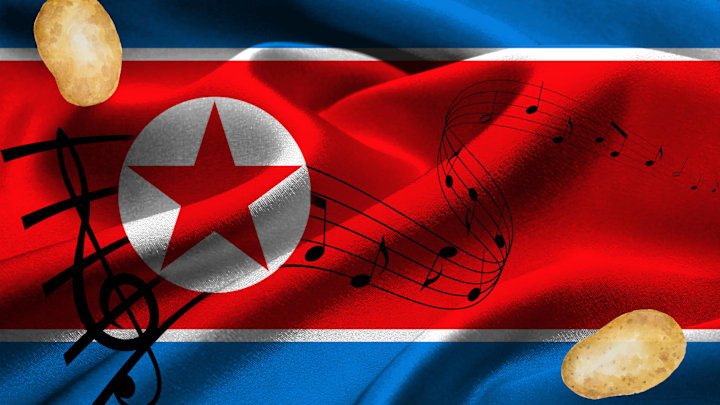North Korea is a strange land. In 2012, the dictatorship published a press release claiming to have discovered a unicorn lair in a cave. Another time, the country boasted that Kim Jong-il had shot 11 holes-in-one during his first-ever round of golf. Most recently, the DPRK argued that their former Dear Leader, who died in 2011, had invented … the burrito.
It sounds ridiculous. But the truth is, there’s a reason for North Korea’s mythmaking: Many of these wild stories are, in fact, tools designed to prop up the country’s cult of personality, as a way to convince the populace that the Kims wield God-like powers.
And wacky stories aren’t the only piece of propaganda in the regime’s tool belt. In fact, music may be the country’s most powerful, and pervasive, political gimmick.
Take the morning wake-up call. In some parts of the country, speakers ring in the new day by playing the song “Where Are You, Dear General.” Meanwhile, according to Daily NK, the “Song of General Kim Il-sung”—dedicated to North Korea’s founder (and Eternal President)—is piped over intercoms at national ceremonies.
"He severed the chains of the masses, brought them liberty / The sun of Korea today, democratic and free / For the Twenty Points united we stand fast / Over our fair homeland spring has come at last!""Song of General Kim Il-Sung"
Many of these tunes first appeared in nationalistic operas. (Kim Jong-il was a huge fan of film and theatre and, in fact, wrote a book called On the Art of Opera [PDF].) Other pieces were first written as PSAs, designed to encourage the populace to alter their behavior when times got tough. Take, for instance, a tune called "Pyongyang Cold Noodles Are the Best," which was composed during a food shortage. The same is true of “Potato Pride,” which was written to increase tater consumption.
In North Korea, there isn’t much music to dance to; according to a human rights report released in 2021, listening to K-Pop is punishable by execution. (That, of course, didn’t stop Kim Jong-un from indulging himself in a 2018 concert that featured the South Korean girl group Red Velvet.) Instead, most North Koreans have to settle for kitschy—but admittedly catchy—electronic music.
The most popular ensemble in North Korea is the Pochonbo Electronic Ensemble. It’s hard to describe the keytar-loving electro-band’s work, but try to imagine a mashup between a communist Kraftwerk and an authoritarian Abba. Many of Pochonbo’s songs are developed to prop up the personality cult. (“Longing for the General” and “We Always Live Under His Love.”) Other tunes are more militaristic. (“Peace Is On Our Bayonet” and “When Our Ranks Advance.”) Meanwhile, others are more political. (“Let's Defend Socialism” and “Labor Is a Song.”)
"When the mob of invaders attacks us / We will bravely annihilate them / Holding the General’s command in the heart / We took up the bayonets to destroy the enemy.""Peace Is On Our Bayonet"
But North Korean music isn't all warmongering and leader worship; some songs simply reflect on the banalities of life. (“They Say My Criteria for Mate Are Too High”; “I'll Live and Add Luster to My Youthhood.”) Meanwhile, other songs can be most charitably described as pure, unadulterated gaslighting. (“February Is Spring”; “My Country, Nice Place to Live In.”)
But the best of North Korean songs usually endow the Kim family with magical powers. Look no further than … “The General Uses Warp.”
The song, performed by the State Merited Chorus, claims that Kim Jong-il possessed chukjibeop, a magical power first described by ancient Taoists that enabled him to shrink the Earth—putting all of his enemies within an arm’s reach.
"Lightning strikes and he arrives / Every continent is in his palm / He rides through the clouds / to the hills of the frontline!""The General Uses Warp"
Taken literally, the lyrics sound absurd. But, sometimes, life can imitate art: When you consider North Korea’s growing nuclear arsenal—experts say it could have as many as 60 atomic warheads—it’s easy to feel the distance between Pyongyang and home shrink.
Lucas Reilly is the writer and co-director of the podcast Big Brother: North Korea’s Forgotten Prince, a show exploring North Korean culture and the mysteries behind the assassination of Kim Jong-nam. Listen to the podcast here!
